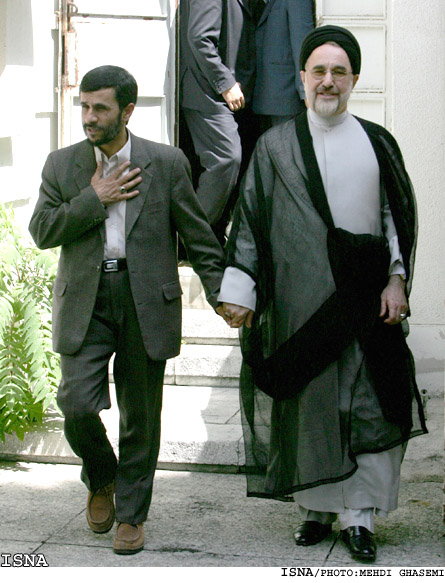
Catherine Philp | February 11
IRAN'S former president was set upon by an angry stick-wielding mob overnight amid celebrations of the 30th anniversary of the Islamic Revolution on the streets of Tehran.
The attack on Mohammed Khatami came just two days after the reformist cleric announced he would be running against the hardline incumbent Mahmoud Ahmadinejad in June's presidential elections.
Mr Khatami, then a little known cleric, came to global attention when he was elected to the presidency in 1997, capturing almost 70 per cent of the vote. Succeeded in 2005 by Mr Ahmadinejad, he blamed hardline elements in the clerical establishment for obstructing his reformist agenda.
During the revolutionary celebrations, attackers waving sticks approached the cleric, shouting “Death to Khatami. We do not want American government.”
According to Mr Khatami’s Baran Foundation, the attackers were repelled by his own supporters, who chanted, “Khatami, Khatami, we support you.”
Mr Khatami was escorted from the street by his bodyguards who took him to shelter in a nearby building.
The attack emerged as Mr Ahmadinejad led Iran in its celebrations by hinting at a softening of relations towards the US.
The President – internationally isolated because of his country's nuclear ambitions, sponsorship of Hezbollah and Hamas and threats towards Israel – said that he was ready for talks, but only if US policy changes dramatically.
"It is clear that the change (by Obama) must be fundamental and not tactical," the Iranian leader said, in a speech in Tehran. "The Iranian nation will welcome true changes and is ready for dialogue in a climate of equality and mutual respect."
However, cloaking his new rhetoric with threats to respond if the Obama Administration follows the policies of his predecessor, he added: "The world does not want the dark era of (former President Bush) to be repeated. If some people seek to repeat that experience... they should know they will face a much worse fate than that of Bush."
Iran's political system is a combination of theocracy and democratic republic, with the country holding elections for the presidency and Parliament. However, its clerics and – ultimately – its Supreme Leader, Ayatollah Ali Khamenei, decide on the candidates and disqualify those considered contrary to Islamic values.
IRAN'S former president was set upon by an angry stick-wielding mob overnight amid celebrations of the 30th anniversary of the Islamic Revolution on the streets of Tehran.
The attack on Mohammed Khatami came just two days after the reformist cleric announced he would be running against the hardline incumbent Mahmoud Ahmadinejad in June's presidential elections.
Mr Khatami, then a little known cleric, came to global attention when he was elected to the presidency in 1997, capturing almost 70 per cent of the vote. Succeeded in 2005 by Mr Ahmadinejad, he blamed hardline elements in the clerical establishment for obstructing his reformist agenda.
During the revolutionary celebrations, attackers waving sticks approached the cleric, shouting “Death to Khatami. We do not want American government.”
According to Mr Khatami’s Baran Foundation, the attackers were repelled by his own supporters, who chanted, “Khatami, Khatami, we support you.”
Mr Khatami was escorted from the street by his bodyguards who took him to shelter in a nearby building.
The attack emerged as Mr Ahmadinejad led Iran in its celebrations by hinting at a softening of relations towards the US.
The President – internationally isolated because of his country's nuclear ambitions, sponsorship of Hezbollah and Hamas and threats towards Israel – said that he was ready for talks, but only if US policy changes dramatically.
"It is clear that the change (by Obama) must be fundamental and not tactical," the Iranian leader said, in a speech in Tehran. "The Iranian nation will welcome true changes and is ready for dialogue in a climate of equality and mutual respect."
However, cloaking his new rhetoric with threats to respond if the Obama Administration follows the policies of his predecessor, he added: "The world does not want the dark era of (former President Bush) to be repeated. If some people seek to repeat that experience... they should know they will face a much worse fate than that of Bush."
Iran's political system is a combination of theocracy and democratic republic, with the country holding elections for the presidency and Parliament. However, its clerics and – ultimately – its Supreme Leader, Ayatollah Ali Khamenei, decide on the candidates and disqualify those considered contrary to Islamic values.
Source: The Australian




















